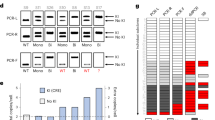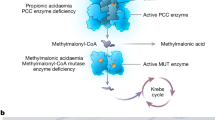Abstract
The outcome of the first pilot study of liver-directed gene therapy is reported here. Five patients with homozygous familial hypercholesterolaemia (FH) ranging in age from 7 to 41 years were enrolled; each patient tolerated the procedure well without significant complications. Transgene expression was detected in a limited number of hepatocytes of liver tissue harvested four months after gene transfer from all five patients. Significant and prolonged reductions in low density lipoprotein (LDL) cholesterol were demonstrated in three of five patients; in vivo LDL catabolism was increased 53% following gene therapy in a receptor negative patient, who realized a reduction in serum LDL equal to ∼150 mg dl−1. This study demonstrates the feasibility of engrafting limited numbers of retrovirus-transduced hepatocytes without morbidity and achieving persistent gene expression lasting at least four months after gene therapy. The variable metabolic responses observed following low-level genetic reconstitution in the five patients studied precludes a broader application of liver-directed gene therapy without modifications that consistently effect substantially greater gene transfer.
This is a preview of subscription content, access via your institution
Access options
Subscribe to this journal
Receive 12 print issues and online access
$209.00 per year
only $17.42 per issue
Buy this article
- Purchase on Springer Link
- Instant access to full article PDF
Prices may be subject to local taxes which are calculated during checkout
Similar content being viewed by others
References
Brown, M.S. & Goldstein, J.L. A receptor-mediated pathway for cholesterol homeostasis. Science 232, 34–37 (1986).
Goldstein, J.L. & Brown, M.S. Familial hypercholesterolemia. Lipoprotein and lipid metabolism disorders. In Metabolic Basis of Inherited Disease, 6th edn (eds Scriver, C.R., Beaudet, A.L., Sly, W.S. & Valle, D.) 1215–1250 (McGraw-Hill, New York, 1989).
Uauy, R., Vega, G.L., Grundy, S.M. & Bilheimer, D.M. Lovastatin therapy in receptor-negative familial hypercholesterolemia: Lack of effect on low-density lipoprotein concentrations or turnover. J. Pediatr. 113, 387–392 (1988).
Malloy, M.J., Kane, J.P., Kunitake, S.T. & Tun, P. Complimentarity of colestipol, niacin and lovastatin in treatment of severe familial hypercholesterolemia. Ann. intern. Med. 107, 616–623 (1987).
Starzl, T.E. et al. Portacaval shunt in patients with familial hypercholesterolemia. Ann. Surg. 198, 273–283 (1983).
Deckelbaum, R.J., Lees, R.S., Small, D.M., Hedberg, S.E. & Grundy, S.M. Failure of complete bile diversion and oral bile acid therapy in the treatment of homozygous familial hypercholesterolemia. New Engl. J. Med. 296, 465–470 (1977).
Bilheimer, D.W., Goldstein, J.L., Grundy, S.M. & Starzl, T.E. Liver transplantation to provide low density lipoprotein receptors and lower plasma cholesterol in a child with homozygous familial hypercholesterolemia. New Engl. J. Med. 311, 1658–1664 (1984).
Hoeg, J.M., Starzl, T.E. & Brewer, H.B. Liver transplantation for treatment of cardiovascular disease: Comparison with medication and plasma exchange in homozygous familial hypercholesterolemia. Am. J. Cardiol. 59, 705–707 (1987).
Thompson, G.R., Barbir, M., Okabayshi, K., Trayner, I. & Larkin, S. Plasmapheresis in familial hypercholesterolemia. Arteriosclerosis (Suppl.) 9, 1152–1157 (1989).
Gordon, B.R. et al. Treatment of refractory familial hypercholesterolemia by low-density lipoprotein apheresis using an automated dextran sulfate Cellulose adsorption system. Am. J. Cardiol. 70, 1010–1016 (1992).
Goldstein, J.L., Kita, T. & Brown, M.S. Defective lipoprotein receptors and atherosclerosis. New Engl. J. Med. 309, 288–296 (1983).
Ishibashi, S. et al. Hypercholesterolemia in low density lipoprotein receptor knockout mice and its reversal by adenovirus-mediated gene delivery. J. clin. Invest. 92, 883–893 (1993).
Chowdhury, J.R. et al. Long-term improvement of hypercholesterolemia after ex vivo gene therapy in LDLR-deficient rabbits. Science 254, 1802–1805 (1991).
Grossman, M., Wilson, J.M. & Raper, S.E. A novel approach for Introducing hepatocytes into the portal circulation. J. Lab. clin. Med. 121, 472–478 (1993).
Grossman, M., Raper, S.E. & Wilson, J.M. Transplantation of genetically-modified autologous hepatocytes into non-human primates: Feasibility and short-term toxicity. Hum. Gene Ther. 3, 501–510 (1992).
Wilson, J.M. et al. Clinical protocol: Ex vivo gene therapy of familial hypercholesterolemia. Hum. Gene Ther. 3, 179–222 (1992).
Grossman, M. et al. Successful ex vivo gene therapy directed to liver in a patient with familial hypercholesterolemia. Nature Genet. 6, 335–341 (1994).
Raper, S.E. et al. Safety and feasibility of liver-directed ex vivo gene therapy for homozygous familial hypercholesterolemia. Ann. Surg. (in the press).
Rader, D.J. et al. The LDL receptor is not required for normal catabolism of Lp (a) in humans. J. clin. Invest. 95, 1403–1408 (1995).
Grossman, G., Raper, S.E. & Wilson, J.M. Towards liver-directed gene therapy: Retrovirus-mediated gene transfer into human hepatocytes. Somatic Cell molec. Genet. 17, 601–607 (1991).
Adams, R.M. et al. Transduction of primary human hepatocytes with amphotropic and xenotropic retroviral vectors. Proc. natn. Acad. Sci. U.S.A. 89, 8981–8985 (1992).
Brown, M.S., Goldstein, J.L., Havel, R.J. & Steinberg, D. Gene therapy for cholesterol. Nature Genet. 7, 349–350 (1994).
Ishibashi, S. et al. Hypercholesterolemia in low density lipoprotein receptor knockout mice and its reversal by adenovirus-mediated gene delivery. J. clin. Invest. 92, 883–893 (1993).
Kozarsky, K.F. et al. In vivo correction of low density lipoprotein receptor deficiency in the Watanabe heritable hyperlipidemic rabbit with recombinant adenoviruses. J. biol. Chem. 269, 13695–13702 (1994).
Hobbs, H., Brown, M.S. & Goldstein, J.L. Molecular genetics of the LDL receptor gene in familial hypercholesterolemia. Hum. Mut. 1, 445–466 (1992).
Leitersdorf, E., Tobin, E.J., Davignon, J. & Hobbs, H.H. Common low-density lipoprotein receptor mutations in the French Canadian population. J. clin. Invest. 85, 1014–1023 (1990).
Author information
Authors and Affiliations
Rights and permissions
About this article
Cite this article
Grossman, M., Rader, D., Muller, D. et al. A pilot study of ex vivo gene therapy for homozygous familial hypercholesterolaemia. Nat Med 1, 1148–1154 (1995). https://doi.org/10.1038/nm1195-1148
Received:
Accepted:
Published:
Issue Date:
DOI: https://doi.org/10.1038/nm1195-1148
This article is cited by
-
Bile-duct proliferation as an unexpected side-effect after AAV2-LDLR gene transfer to rabbit liver
Scientific Reports (2019)
-
Function and Immunogenicity of Gene-corrected iPSC-derived Hepatocyte-Like Cells in Restoring Low Density Lipoprotein Uptake in Homozygous Familial Hypercholesterolemia
Scientific Reports (2019)
-
Human hepatocyte transplantation for liver disease: current status and future perspectives
Pediatric Research (2018)
-
Hepatocyte transplantation and advancements in alternative cell sources for liver-based regenerative medicine
Journal of Molecular Medicine (2018)
-
Clinical Hepatocyte Transplantation: What Is Next?
Current Transplantation Reports (2017)



